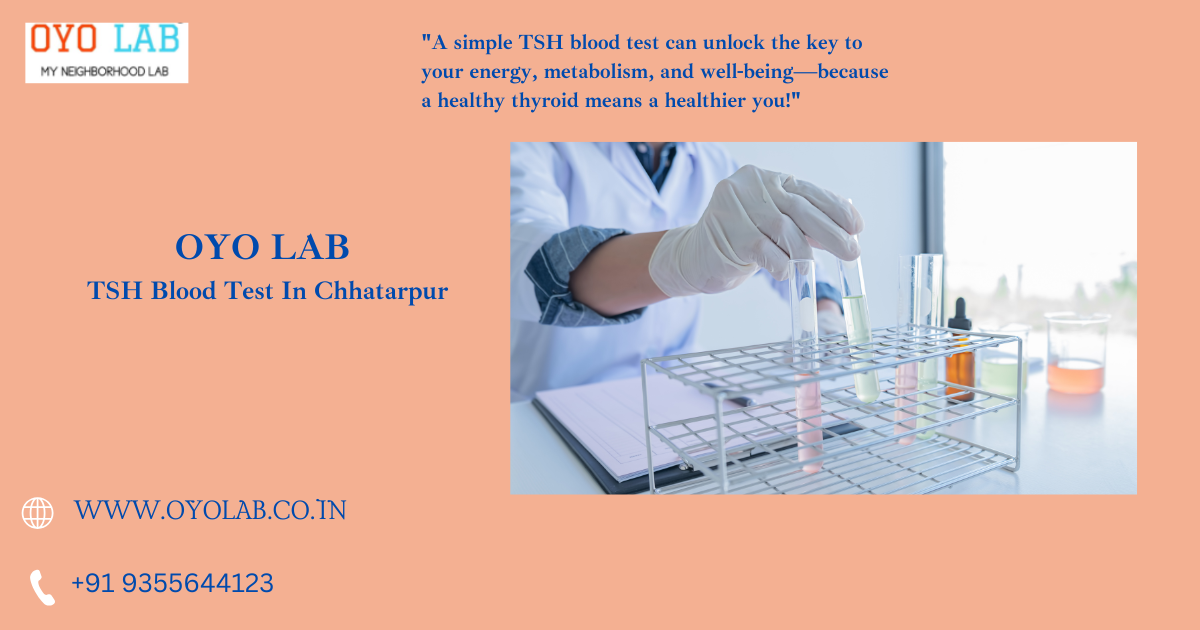
TSH Blood Test In Chhatarpur
By Shilpa | March 04, 2025
What Is TSH Blood Test ?
A TSH (Thyroid-Stimulating Hormone) Blood Test measures the level of TSH in your blood. TSH is produced by the pituitary gland and helps regulate how much thyroid hormone (T3 & T4) your thyroid gland makes.
This test is commonly used to check thyroid function and diagnose conditions like:
- Hypothyroidism (Underactive thyroid) – Low thyroid hormone levels lead to fatigue, weight gain, and cold intolerance.
- Hyperthyroidism (Overactive thyroid) – High thyroid hormone levels cause weight loss, rapid heartbeat, and nervousness.
Why Is It Done?
Doctors order a TSH test if you have symptoms of a thyroid problem, such as:
✅ Fatigue or weakness
✅ Weight gain or loss
✅ Hair thinning or dry skin
✅ Depression or anxiety
✅ Irregular heartbeat
✅ Trouble tolerating cold or heat
Normal TSH Levels (may vary by lab)
- 0.4 – 4.0 mIU/L (normal range)
- High TSH → Indicates hypothyroidism (underactive thyroid)
- Low TSH → Suggests hyperthyroidism (overactive thyroid)
How Is It Done?
- A simple blood test is taken from a vein in your arm.
- No special preparation is needed, but some medications may affect results.
Who Should Get a TSH Test?
- People with thyroid symptoms
- Those with a family history of thyroid disease
- Pregnant women (thyroid issues can affect pregnancy)
- Individuals with unexplained fatigue, weight changes, or heart issues
Importance Of TSH Blood Test
A TSH (Thyroid-Stimulating Hormone) Blood Test is essential for diagnosing and managing thyroid disorders. It helps evaluate how well your thyroid gland is functioning, which is crucial for maintaining overall health.
1. Detects Thyroid Disorders Early
- Helps diagnose hypothyroidism (underactive thyroid) and hyperthyroidism (overactive thyroid) before symptoms worsen.
- Prevents complications like heart disease, infertility, and metabolic issues.
2. Monitors Thyroid Treatment
- Ensures correct medication dosage for individuals taking thyroid hormone replacement (e.g., levothyroxine).
- Tracks effectiveness of treatments for hyperthyroidism (e.g., antithyroid drugs, radioactive iodine, or surgery).
3. Helps Explain Unexplained Symptoms
- If you're experiencing fatigue, weight gain/loss, depression, hair thinning, or irregular heartbeat, a TSH test can help find the cause.
4. Essential for Pregnancy Health
- TSH imbalances during pregnancy can lead to complications like miscarriage, premature birth, and developmental issues in babies.
- Doctors recommend thyroid screening for pregnant women, especially those with a history of thyroid disease.
5. Supports Overall Hormonal Balance
- Thyroid hormones regulate metabolism, energy levels, mood, and body temperature.
- Keeping TSH levels in check ensures the proper function of various organs and systems.
6. Recommended for High-Risk Individuals
- People with a family history of thyroid disease
- Women over 60 (higher risk of thyroid issues)
- Individuals with autoimmune diseases (e.g., Hashimoto’s or Graves’ disease)
- People with unexplained cholesterol changes
Benefits Of TSH Blood Test
A TSH (Thyroid-Stimulating Hormone) Blood Test offers several health advantages by helping diagnose, monitor, and manage thyroid-related conditions. Here are the key benefits:
1. Early Detection of Thyroid Disorders
- Identifies hypothyroidism (underactive thyroid) and hyperthyroidism (overactive thyroid) before symptoms become severe.
- Prevents complications like heart disease, infertility, and metabolic issues.
2. Helps Manage Symptoms
- If you're experiencing fatigue, weight changes, hair loss, or mood swings, a TSH test can help determine if your thyroid is the cause.
- Allows for early treatment, improving overall well-being.
3. Monitors Thyroid Treatment Effectiveness
- Ensures proper medication dosage for those on thyroid hormone replacement therapy (levothyroxine).
- Helps doctors adjust treatments for hyperthyroidism (e.g., antithyroid drugs, radioactive iodine therapy, or surgery).
4. Supports Pregnancy and Fetal Development
- Detects thyroid imbalances that can cause miscarriage, premature birth, or developmental issues in babies.
- Recommended for pregnant women, especially those with a history of thyroid disease.
5. Prevents Long-Term Health Complications
- Untreated thyroid disorders can lead to heart problems, high cholesterol, osteoporosis, and mental health issues.
- Regular monitoring helps prevent serious complications.
6. Essential for High-Risk Individuals
- People with a family history of thyroid disease
- Women over 60 (higher risk of thyroid issues)
- Individuals with autoimmune disorders (e.g., Hashimoto’s or Graves’ disease)
- People with unexplained weight, energy, or mood changes
7. Simple, Quick, and Reliable
- A fast and minimally invasive blood test that provides clear insights into thyroid function.
- Helps doctors make informed decisions about treatment.